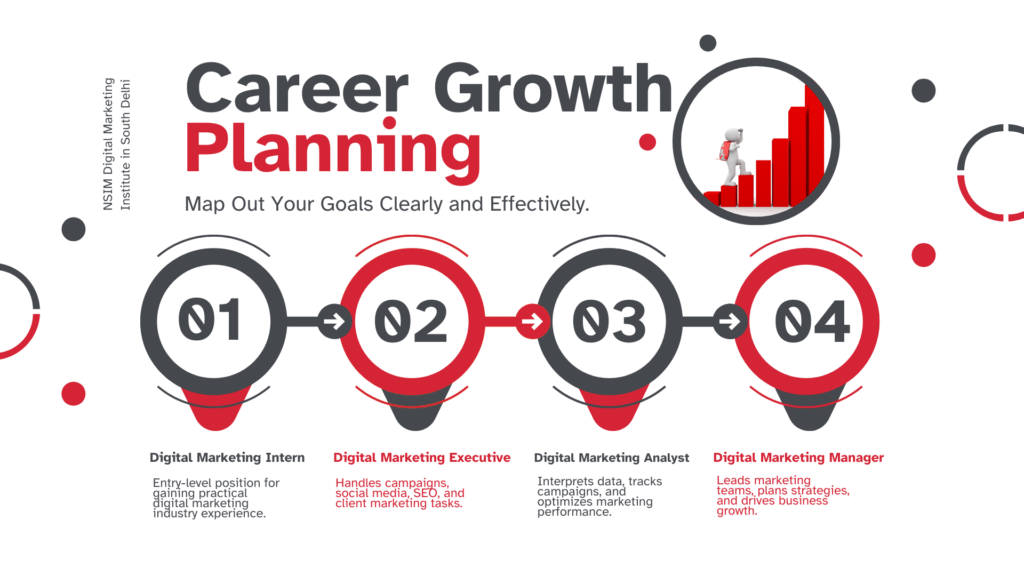Digital marketing has become the backbone of modern business success. As we move into 2025, the demand for skilled digital marketing professionals continues to soar, making digital marketing courses more relevant than ever. Whether you’re a complete beginner or looking to pivot careers, understanding what a digital marketing course entails can unlock the door to a dynamic and rewarding career.
What Is Digital Marketing?
Digital marketing encompasses all marketing efforts that leverage electronic devices and the internet to promote brands, products, or services. It connects businesses with potential customers through digital channels, offering real-time interaction, precise targeting, and measurable results—unlike traditional marketing methods.
What Is a Digital Marketing Course?
A digital marketing course is a structured educational program designed to equip individuals with the skills, strategies, and tools needed to excel in the digital marketing field. These courses range from beginner-level introductions to advanced specializations, covering topics like social media marketing, SEO, and data analytics.
Courses are delivered in various formats, including online platforms, workshops, university programs, and blended learning options. They blend theoretical knowledge with practical experience, enabling students to apply what they’ve learned in real-world scenarios.
Core Components of Digital Marketing Courses
Digital marketing courses typically cover the following key areas:
Search Engine Optimization (SEO)
SEO is the foundation of online visibility. Students learn to optimize websites and content to rank higher on search engine results pages, driving organic traffic and boosting online presence.
Pay-Per-Click Advertising (PPC)
PPC training focuses on platforms like Google Ads and Microsoft Advertising, teaching students how to create, manage, and optimize paid ad campaigns for maximum ROI.
Social Media Marketing
This module explores strategies for platforms like Facebook, Instagram, LinkedIn, X, and TikTok, covering content creation, community management, and social advertising.
Content Marketing
Students learn to craft valuable, engaging content—such as blogs, videos, and strategic campaigns—to attract and retain target audiences.
Email Marketing
Email marketing remains a high-ROI channel. Courses teach list building, campaign creation, automation, and performance optimization.
Digital Analytics
Understanding data is critical for success. Learners use tools like Google Analytics to interpret metrics and make data-driven decisions.
Conversion Rate Optimization (CRO)
CRO focuses on improving website performance and user experience to increase the percentage of visitors who complete desired actions.
Marketing Automation
Advanced courses cover tools and strategies for automating repetitive marketing tasks, nurturing leads, and delivering personalized customer experiences.
Types of Digital Marketing Courses
Online Courses
Flexible and accessible, online courses allow self-paced learning. Popular platforms include Coursera, Udemy, LinkedIn Learning, and specialized providers like NSIM, which offers comprehensive digital marketing training.
Certification Programs
Certifications from Google, Meta, HubSpot, Hootsuite, and institutions like NSIM provide industry-recognized credentials to enhance career prospects.
University Degrees
Many universities now offer bachelor’s and master’s degrees in digital marketing, providing rigorous academic training.
Bootcamps and Intensive Programs
These short, intensive courses (3-6 months) prepare students for entry-level roles quickly.
Corporate Training
Companies often provide in-house training to keep teams updated on evolving digital trends.
Benefits of Taking a Digital Marketing Course
In-Demand Career Opportunities
Digital marketing skills are sought after across industries, with businesses of all sizes needing experts to navigate the digital landscape.
Competitive Salaries
Professionals in digital marketing often earn competitive salaries, with ample opportunities for career growth.
Entrepreneurial Applications
Skills learned can be applied to launching or growing your own business or freelance practice.
Measurable Results
Digital marketing offers clear metrics and ROI, making it easier to demonstrate value and success.
Continuous Learning
The ever-evolving nature of digital marketing ensures ongoing opportunities for skill development.
Remote Work Flexibility
Many digital marketing roles offer remote work options, providing flexibility and work-life balance.
Choosing the Right Digital Marketing Course
When selecting a course, consider the following:
- Comprehensive Curriculum: Opt for courses covering multiple aspects of digital marketing for broader career opportunities.
- Hands-On Experience: Look for programs with practical projects, case studies, and real-world applications, such as those offered by NSIM.
- Industry-Recognized Instructors: Courses led by experienced professionals offer valuable insights and networking opportunities.
- Up-to-Date Content: Ensure the curriculum reflects the latest trends, tools, and best practices.
- Certifications: Choose courses offering credentials valued by employers, like those from NSIM or Google.
- Student Support: Access to mentors, instructors, and peer communities enhances learning and growth.
Prerequisites for Digital Marketing Courses
- Basic Computer Skills: Familiarity with computers and web browsing is essential.
- Analytical Thinking: Success requires analyzing data and making strategic decisions.
- Creativity and Communication: Strong written and verbal skills, along with creative campaign development, are key.
- No Experience Needed: Most beginner courses are designed for those without prior marketing experience, welcoming career changers and fresh graduates.
Career Paths After a Digital Marketing Course
Completing a course opens doors to various roles, including:
- Digital Marketing Specialist: Entry-level role executing campaigns across multiple channels.
- SEO Specialist: Focused on improving search engine visibility through technical and content optimization.
- Social Media Manager: Managing brand presence, content, and ads on social platforms.
- Content Marketing Manager: Developing and executing content strategies.
- PPC Manager: Overseeing paid ad campaigns on search engines and social media.
- Email Marketing Specialist: Designing and optimizing email campaigns.
- Digital Marketing Manager: Leading overall strategies and teams.
- Marketing Analyst: Analyzing data to provide campaign insights.
- Freelance Digital Marketer: Working independently with multiple clients.
- Digital Marketing Consultant: Offering strategic expertise to businesses.
Cost and ROI Considerations
- Course Investment: Costs range from free introductory courses to programs costing thousands of dollars. Align your choice with your budget and goals.
- Time Investment: Courses vary from short modules to months-long programs. Balance this with your other commitments.
- Expected ROI: The investment often pays off quickly through enhanced career opportunities and earning potential.
- Financial Aid: Many platforms, including NSIM, offer payment plans, scholarships, or financial assistance.
Future Trends in Digital Marketing Education
- AI Integration: Courses are incorporating AI-driven marketing techniques and automation.
- Privacy and Data Protection: Evolving regulations emphasize ethics and compliance in marketing.
- Video and Visual Content: Curricula reflect the growing importance of video and visual marketing.
- Voice Search Optimization: Courses now cover voice SEO and audio marketing strategies.
- Personalization: Advanced programs focus on tailored marketing experiences and customer journeys.
Getting Started: Your Next Steps
- Define Your Goals: Determine whether you aim to switch careers, advance in your current role, or start a business.
- Research Courses: Compare options based on curriculum, format, cost, and reviews, including providers like NSIM.
- Start with Fundamentals: Beginners should opt for comprehensive introductory courses.
- Build a Portfolio: Create sample campaigns to showcase your skills to employers.
- Network: Join digital marketing communities, attend webinars, and connect with professionals.
- Stay Updated: Commit to continuous learning to keep pace with industry changes.
Conclusion
Digital marketing courses are a powerful investment in your future. With businesses increasingly relying on digital channels, the demand for skilled marketers is skyrocketing. Whether you choose an online course, certification from providers like NSIM, or a degree, the skills you gain are versatile and in-demand across industries.
Success lies in selecting a course aligned with your goals, engaging in hands-on practice, and staying current with trends. Digital marketing is not just about mastering tools—it’s about understanding people, solving problems, and forging meaningful connections between brands and consumers. Start your journey today, and position yourself for a thriving career in the exciting, ever-evolving world of digital marketing in 2025.




